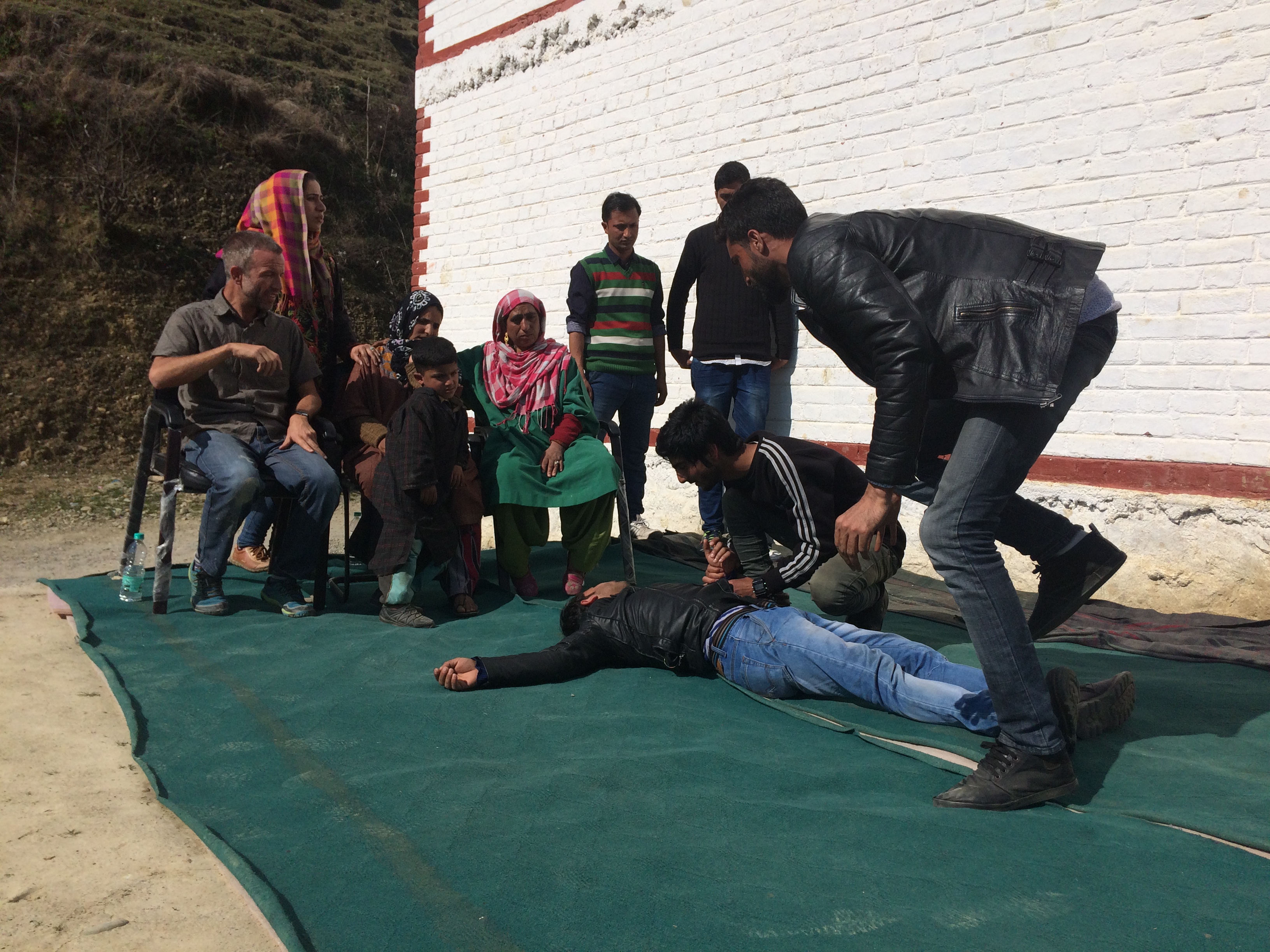18 youth and adults from across Kashmir have gathered for a 10-day Playback Theatre workshop on the outskirts of Srinagar as part of PeaceWorks’ Dialogue for Peace project. Facilitated by Ben Rivers, this by far has been one of the most intense and immersive workshops we have ever organised.
Post the training we organised for the group to go into the community and practice the skills they had acquired under Ben’s supervision. The idea was to make them confident and self reliant in order to continue the project within their communities. An interactive form of improvisational theatre in which audience members tell stories from their lives and watch them enacted on the spot, Playback Theatre is a very powerful tool for social dialogue, peace building and conflict resolution.
Here are Ben’s reflections on the ten days he spent training youth in Kashmir.
In Kashmir: A mother sees her son
The stories I heard today reminded me so much of Palestine: Friday protests, military raids, police brutality, repressive laws – a hunger for freedom, dignity and self-determination … And within this, a warmth, kindness, generosity and humour that speaks to us all – reminding us, that we do indeed belong to one, larger, human family . . .
Today, one woman after another came forward to share their stories; stories about the enforced disappearance of their menfolk at the hands of the Indian army and ‘security’ establishment.
One woman showed the scarred ends of her fingers. “When they came for my son, I tried to hold on to him. I held him tightly with all my strength! But they beat my hands over and over with the butt of their guns – until my fingers broke. Then they struck him down in front of my eyes and dragged him away. Ever since I have been searching for him . . .”
As each story was told and enacted, we drew closer – united in deep grief and a desire for justice.
At the end of the event, one woman shared with the actors: “They disappeared my son but I see him alive in each one of you.”
And one of the actors – an orphan – responded: “So many of us have lost our mothers, but we see her in you.”
Since 1989, around 8,000 – 10,000 cases of enforced disappearances have been reported in Indian Administered Kashmir.
Farmers, potters, carpet weavers, auto drivers, students, daily wage earners and other ordinary civilians have simply vanished at the hands of the Indian armed forces.
Today, a newly trained troupe of Kashmiri men joined in solidarity with others whose relatives have been disappeared. By listening to, and performing their stories they aimed to support the larger movement towards truth, justice and accountability.
As Milan Kundera said, “The struggle of man against power is the struggle of memory against forgetfulness”.
This morning as our troupe of actors traveled north, we encountered a road block organised by Kashmiri women in protest against the announced cut in rice rations distributed under the National Food Security Act (NFSA). Later in the day, as we performed stories from women in Kupwara, we heard in more detail about the anguish this cut is causing for impoverished communities across Kashmir. In a region that holds 700,000 troops, one must ask where spending priorities should really lie.
Over the past week, this group of men from Srinagar, Ganderbal and Kupwara have been training in Playback Theatre. The 10-day residential intensive – the first of its kind in Kashmir – was organized by the HELP Foundation in partnership with PeaceWorks. On 29th February we will perform true stories shared by widowed women in Kupwara. On March 1st, we’ll hold a performance in Srinagar. Both events will provide community members with an opportunity to speak openly about the reality and impact of political violence in Kashmir.
We also met Shahid Malik and Parveena Ahangar who is the Founder and Chairperson of the Association of Parents of Disappeared Persons (APDP) in Indian Administered Kashmir. She started APDP in 1995 to provide support and mobilize family members impacted by enforced disappearances. Parveena – also referred to as the “Iron lady of Kashmir” – was nominated for a Nobel Peace Prize in 2005 for her human rights activism. We met to discuss a Playback Theatre performance for relatives of the disappeared.
Ben Rivers, 2016.


